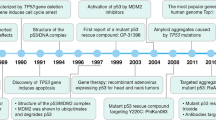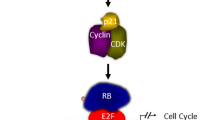Abstract
The cyclin-dependent kinase (CDK) inhibitor 1A, p21/Cip1, is a vital cell cycle regulator, dysregulation of which has been associated with a large number of human malignancies. One critical mechanism that controls p21 function is through its degradation, which allows the activation of its associated cell cycle-promoting kinases, CDK2 and CDK4. Thus delineating how p21 is stabilized and degraded will enhance our understanding of cell growth control and offer a basis for potential therapeutic interventions. Here we report a novel regulatory mechanism that controls the dynamic status of p21 through its interaction with Cdk5 and Abl enzyme substrate 1 (Cables1). Cables1 has a proposed role as a tumor suppressor. We found that upregulation of Cables1 protein was correlated with increased half-life of p21 protein, which was attributed to Cables1/p21 complex formation and supported by their co-localization in the nucleus. Mechanistically, Cables1 interferes with the proteasome (Prosome, Macropain) subunit alpha type 3 (PSMA3) binding to p21 and protects p21 from PSMA3-mediated proteasomal degradation. Moreover, silencing of p21 partially reverses the ability of Cables1 to induce cell death and inhibit cell proliferation. In further support of a potential pathophysiological role of Cables1, the expression level of Cables1 is tightly associated with p21 in both cancer cell lines and human lung cancer patient tumor samples. Together, these results suggest Cables1 as a novel p21 regulator through maintaining p21 stability and support the model that the tumor-suppressive function of Cables1 occurs at least in part through enhancing the tumor-suppressive activity of p21.
This is a preview of subscription content, access via your institution
Access options
Subscribe to this journal
Receive 50 print issues and online access
$259.00 per year
only $5.18 per issue
Buy this article
- Purchase on Springer Link
- Instant access to full article PDF
Prices may be subject to local taxes which are calculated during checkout







Similar content being viewed by others
References
Abbas T, Dutta A . p21 in cancer: intricate networks and multiple activities. Nat Rev Cancer 2009; 9: 400–414.
Warfel NA, El-Deiry WS . p21WAF1 and tumourigenesis: 20 years after. Curr Opin Oncol 2013; 25: 52–58.
Yu ZK, Gervais JL, Zhang H . Human CUL-1 associates with the SKP1/SKP2 complex and regulates p21(CIP1/WAF1) and cyclin D proteins. Proc Natl Acad Sci USA 1998; 95: 11324–11329.
Lin HK, Wang G, Chen Z, Teruya-Feldstein J, Liu Y, Chan CH et al. Phosphorylation-dependent regulation of cytosolic localization and oncogenic function of Skp2 by Akt/PKB. Nat Cell Biol 2009; 11: 420–432.
Bornstein G, Bloom J, Sitry-Shevah D, Nakayama K, Pagano M, Hershko A . Role of the SCFSkp2 ubiquitin ligase in the degradation of p21Cip1 in S phase. J Biol Chem 2003; 278: 25752–25757.
Abbas T, Sivaprasad U, Terai K, Amador V, Pagano M, Dutta A . PCNA-dependent regulation of p21 ubiquitylation and degradation via the CRL4Cdt2 ubiquitin ligase complex. Genes Dev 2008; 22: 2496–2506.
Lopez-Pajares V, Kim MM, Yuan ZM . Phosphorylation of MDMX mediated by Akt leads to stabilization and induces 14-3-3 binding. J Biol Chem 2008; 283: 13707–13713.
Nishitani H, Shiomi Y, Iida H, Michishita M, Takami T, Tsurimoto T . CDK inhibitor p21 is degraded by a proliferating cell nuclear antigen-coupled Cul4-DDB1Cdt2 pathway during S phase and after UV irradiation. J Biol Chem 2008; 283: 29045–29052.
Amador V, Ge S, Santamaria PG, Guardavaccaro D, Pagano M . APC/C(Cdc20) controls the ubiquitin-mediated degradation of p21 in prometaphase. Mol Cell 2007; 27: 462–473.
Touitou R, Richardson J, Bose S, Nakanishi M, Rivett J, Allday MJ . A degradation signal located in the C-terminus of p21WAF1/CIP1 is a binding site for the C8 alpha-subunit of the 20S proteasome. EMBO J 2001; 20: 2367–2375.
Sheaff RJ, Singer JD, Swanger J, Smitherman M, Roberts JM, Clurman BE . Proteasomal turnover of p21Cip1 does not require p21Cip1 ubiquitination. Mol Cell 2000; 5: 403–410.
Jin Y, Zeng SX, Sun XX, Lee H, Blattner C, Xiao Z et al. MDMX promotes proteasomal turnover of p21 at G1 and early S phases independently of, but in cooperation with, MDM2. Mol Cell Biol 2008; 28: 1218–1229.
Zhang Z, Wang H, Li M, Agrawal S, Chen X, Zhang R . MDM2 is a negative regulator of p21WAF1/CIP1, independent of p53. J Biol Chem 2004; 279: 16000–16006.
Jascur T, Brickner H, Salles-Passador I, Barbier V, El Khissiin A, Smith B et al. Regulation of p21(WAF1/CIP1) stability by WISp39, a Hsp90 binding TPR protein. Mol Cell 2005; 17: 237–249.
Zukerberg LR, Patrick GN, Nikolic M, Humbert S, Wu CL, Lanier LM et al. Cables links Cdk5 and c-Abl and facilitates Cdk5 tyrosine phosphorylation, kinase upregulation, and neurite outgrowth. Neuron 2000; 26: 633–646.
Wu CL, Kirley SD, Xiao H, Chuang Y, Chung DC, Zukerberg LR . Cables enhances cdk2 tyrosine 15 phosphorylation by Wee1, inhibits cell growth, and is lost in many human colon and squamous cancers. Cancer Res 2001; 61: 7325–7332.
Tsuji K, Mizumoto K, Yamochi T, Nishimoto I, Matsuoka M . Differential effect of ik3-1/cables on p53- and p73-induced cell death. J Biol Chem 2002; 277: 2951–2957.
Wang N, Guo L, Rueda BR, Tilly JL . Cables1 protects p63 from proteasomal degradation to ensure deletion of cells after genotoxic stress. EMBO Rep 2010; 11: 633–639.
Kirley SD, Rueda BR, Chung DC, Zukerberg LR . Increased growth rate, delayed senescense and decreased serum dependence characterize cables-deficient cells. Cancer Biol Ther 2005; 4: 654–658.
Zukerberg LR, DeBernardo RL, Kirley SD, D'Apuzzo M, Lynch MP, Littell RD et al. Loss of cables, a cyclin-dependent kinase regulatory protein, is associated with the development of endometrial hyperplasia and endometrial cancer. Cancer Res 2004; 64: 202–208.
Kirley SD, D'Apuzzo M, Lauwers GY, Graeme-Cook F, Chung DC, Zukerberg LR . The Cables gene on chromosome 18Q regulates colon cancer progression in vivo. Cancer Biol Ther 2005; 4: 861–863.
Dong Q, Kirley S, Rueda B, Zhao C, Zukerberg L, Oliva E . Loss of cables, a novel gene on chromosome 18q, in ovarian cancer. Mod Pathol 2003; 16: 863–868.
Park do Y, Sakamoto H, Kirley SD, Ogino S, Kawasaki T, Kwon E et al. The Cables gene on chromosome 18q is silenced by promoter hypermethylation and allelic loss in human colorectal cancer. Am J Pathol 2007; 171: 1509–1519.
Tan D, Kirley S, Li Q, Ramnath N, Slocum HK, Brooks JS et al. Loss of cables protein expression in human non-small cell lung cancer: a tissue microarray study. Hum Pathol 2003; 34: 143–149.
Arnason T, Pino MS, Yilmaz O, Kirley SD, Rueda BR, Chung DC et al. Cables1 is a tumor suppressor gene that regulates intestinal tumor progression in Apc(Min) mice. Cancer Biol Ther 2013; 14: 672–678.
Sakamoto H, Friel AM, Wood AW, Guo L, Ilic A, Seiden MV et al. Mechanisms of Cables 1 gene inactivation in human ovarian cancer development. Cancer Biol Ther 2008; 7: 180–188.
Coleman ML, Marshall CJ, Olson MF . Ras promotes p21(Waf1/Cip1) protein stability via a cyclin D1-imposed block in proteasome-mediated degradation. EMBO J 2003; 22: 2036–2046.
Zhu H, Nie L, Maki CG . Cdk2-dependent Inhibition of p21 stability via a C-terminal cyclin-binding motif. J Biol Chem 2005; 280: 29282–29288.
Hershko A, Ciechanover A . The ubiquitin system. Annu Rev Biochem 1998; 67: 425–479.
Zirbes TK, Baldus SE, Moenig SP, Nolden S, Kunze D, Shafizadeh ST et al. Prognostic impact of p21/waf1/cip1 in colorectal cancer. Int J Cancer 2000; 89: 14–18.
Komiya T, Hosono Y, Hirashima T, Masuda N, Yasumitsu T, Nakagawa K et al. p21 expression as a predictor for favorable prognosis in squamous cell carcinoma of the lung. Clin Cancer Res 1997; 3: 1831–1835.
Acknowledgements
We thank the past and present members of the Fu/Khuri laboratory for many stimulating discussions. We also thank Dr Zukerberg LR and Dr Rueda BR (Massachusetts General Hospital) for sharing reagents. This work was supported by the National Institutes of Health Grant P01 CA116676 (to FRK and HF), Georgia Cancer Coalition (to HF and FRK), the Chinese National Natural Science Foundation No. 31271444 and No. 81201726 (to ZS), the Foundation for Research Cultivation and Innovation of Jinan University No. 21612407 (to ZS), the Science and Technology Program of Guangzhou No. 14200010 ( to ZS) and the Specialized Research Fund for the Doctoral Program of Higher Education No. 20124401120007 (to ZS).
Author information
Authors and Affiliations
Corresponding authors
Ethics declarations
Competing interests
The authors declare no conflict of interest.
Rights and permissions
About this article
Cite this article
Shi, Z., Li, Z., Li, Z. et al. Cables1 controls p21/Cip1 protein stability by antagonizing proteasome subunit alpha type 3. Oncogene 34, 2538–2545 (2015). https://doi.org/10.1038/onc.2014.171
Received:
Revised:
Accepted:
Published:
Issue Date:
DOI: https://doi.org/10.1038/onc.2014.171
This article is cited by
-
Atypical cyclins: the extended family portrait
Cellular and Molecular Life Sciences (2020)
-
N-myc downstream-regulated gene 1 inhibits the proliferation of colorectal cancer through emulative antagonizing NEDD4-mediated ubiquitylation of p21
Journal of Experimental & Clinical Cancer Research (2019)
-
Proteomic analysis of novel targets associated with the enhancement of TrkA-induced SK-N-MC cancer cell death caused by NGF
Experimental & Molecular Medicine (2016)



